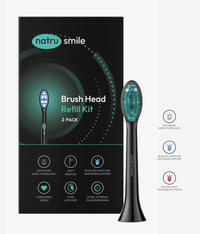
All products are certified by dental expert Dr. Greg Grillo
A tooth extraction is an unpleasant experience, but medically necessary for some people. After the extraction, you might be tempted to drink something warm, sweet, or flavored. After all the hard work of a tooth extraction, you deserve it, right?
It’s not that you don’t deserve it, but you should probably delay the satisfaction. There are many drinks you need to avoid to help your mouth heal after an extraction.
This brings us to the next natural question: are there any drinks I can have after a tooth extraction? The short answer: yes. Below, you’ll find out more about the drinks you can (and cannot) have after an extraction.
What Kind Of Juice Can I Drink After A Tooth Extraction? A Quick Look
Fruit juice comes from natural sources, making it a good source of vitamins. But after a tooth extraction, there are few fruit juices you can drink. Mostly, because of the naturally high sugar of juice.
Sugar turns your mouth into a breeding ground for bacteria. It attracts bad bacteria and reduces your mouth's ph level. So, avoiding it after a tooth extraction is vital. Avoiding sugar helps it heal and prevents any potential infections.
You’ll find this applies to juices with no added sugar and those with added sugar. While less sugar is better, it doesn’t help when your mouth is vulnerable.
Sugar is also one reason you might need an extraction. High-sugar snacks can lead to tooth decay, which requires you to remove the tooth in some cases. So, you might consider this a wake-up call to avoid sugary beverages.
Can I Drink Coffee After A Tooth Extraction?
You should not drink coffee after tooth extraction because it is hot, doesn’t hydrate you, and often contains sugar. These three things mean that coffee should be delayed for a long time after an extraction.
Coffee comes in forms with very high sugar. It can contain up to five grams of sugar, which is similar to some fruits.
If you get your coffee from Starbucks, be extra careful. Many people call Starbucks coffee “dessert with expresso,” so ask about the sugar content of coffee before ordering.
Heat is the second reason you should avoid coffee after a tooth extraction. Having something incredibly hot in your mouth is risky.
After a tooth extraction, your mouth bleeds a lot. To stem the loss, your mouth starts to form a blood clot. When so much heat enters your mouth, it prevents a blood clot from forming.
A blood clot is your body’s natural defense against exposure. So, when a blood clot cannot form, it exposes body parts that aren’t normally out. These “parts” are your bone and nerves, with the “mouth hole” also known as a dry socket.
A dry socket causes an incredible amount of intense pain. So, rather than go through it, you should probably avoid coffee.
When Can I Drink Coffee After Tooth Extraction
You'll want to wait a week after extraction before drinking hot coffee. This gives the blood clot time to be replaced by healed flesh, protecting the underlying nerves. You can also check with your dentist to be sure its fully healed before drinking to be very cautious.
When you start drinking coffee, you might give it time to get used to the heat. If you like hot coffee, consider adding ice to transition back to your full temperature over time.
Can I Drink Coffee After Wisdom Tooth Extraction?
No, you can’t drink coffee after a wisdom tooth extraction. Any tooth extraction holds the same risks of making it hard for your mouth to heal, eventually leading to a dry socket. Wisdom teeth are no different.
Can You Drink Cold Coffee Or Iced Coffee After A Tooth Extraction?
Cold coffee is a bit safer than hot coffee after a tooth extraction. But still, you should avoid drinking any kind of coffee after tooth extraction.
Even with the temperature shift, cold coffee is often sweetened with sugar. The sugar can lead to tooth decay and other issues, turning your mouth into a breeding ground for bacteria.
Naturally, you might think that sugar substitutes will solve this problem. But you’ll still want to avoid drinking cold coffee with stevia (or any other substitute).
Sucralose and similar substitutes have studies proving that they don't contribute to tooth decay, But, we don’t have many studies telling us what they do during a tooth extraction. Because we don’t know, it’s best to avoid it.
When Can I Drink Tea After Tooth Extraction?
Tea has a lower chance to use sugar or other additives. Still, it’s best to wait at least three days before you start drinking any type of tea.
Hot tea is the worst offender. Like hot coffee, drinking hot tea can prevent a blood clot from forming, leading to a dry socket. The second worst offender is sweet tea, which uses a lot of sugar.
Can I Drink Cold Tea After Tooth Extraction?
If you want to drink cold tea (like iced tea), you can drink it within a day or two. Tea generally doesn’t have a lot of additives, making it a decent choice after an extraction.
If your tea is very cold, your mouth might be overly sensitive. Any oral surgery can leave your mouth tender, so make your tea at room temperature.
But, drinking tea after an extraction doesn’t come without risk. Some teas have additives that might affect your mouth after an extraction.
So, search for the effects of those ingredients on your teeth. If there is any sign they might irritate you, avoid them. Alternatively, bring the tea to your dentist so they can tell you whether it's safe.
Naturally, you should avoid additives like honey, known to add sugar to your tea. You sould also avoid citrus-based additives, as acids might affect your blood clot. You might also avoid additives that bring a strong flavor (like ginger) to your tea.
When Can I Drink Soda After Tooth Extraction?
If you ask a dentist, “never” is the best time to drink soda after a tooth extraction. The combo platter of high sugar and acid makes it a terrible combination for your teeth. At the bare minimum, wait three or more weeks before you start drinking it again.
Soda increases tooth decay with its high sugar content and acidic nature. Even if you drink diet soda, the acid eats away your teeth.
When Can You Drink Hot Liquids After A Tooth Extraction?
Whether it be hot chocolate, coffee, or apple cider, you’ll want to wait about a week before drinking after a tooth extraction. This gives you more than enough time to heal.
As we’ve said earlier, hot drinks can contribute to a dry socket. This causes extreme pain from exposed nerve endings normally protected by gums and teeth.
Hot drinks can also irritate your gums. After a tooth extraction, your gums are often sore. They will remain sore for the entire healing process.
How Long After A Tooth Extraction Can I Drink Water?
Water is the best thing you can drink after a tooth extraction. Still, you’ll want to wait until you can remove the gauze from your mouth. So, this is typically about an hour at most.
Water helps you stay hydrated, which is incredibly important when healing. Your mouth will produce a lot of saliva to protect itself from bacteria. Water helps in saliva production, making it very important to avoid infection.
When it comes to drinking water, the only rule is NEVER to use a straw. A straw can create a suction vacuum in your mouth, which can rupture your blood clot. When the blood clot ruptures, it will need to restart healing.
You can even drink non-carbonated flavored waters (like sports drinks) if you want something more interesting. These have light flavors and limited additives, making them a good substitute. Just be sure to avoid anything with sugar.
Can I Drink Alcohol After A Tooth Extraction
No, you cannot drink alcohol after a tooth extraction. Alcohol has similar risks to soda and coffee, making it a bad choice to drink after a tooth extraction.
Alcohol is unique in that it dries out your mouth. When your mouth is dry, it doesn’t make saliva. Because saliva is a natural deterrent against bacteria, it makes your mouth more likely to get infections.
Beyond that, many alcoholic beverages use a lot of sugar. As we’ve said in other parts of this article, sugar can be incredibly bad after oral surgery.
Some alcohol is also known for carbonation, which often relies on acidic compounds. This means that alcohol can be worse for you than soda in many cases.
Can I Drink Milk After A Tooth Extraction?
No, you cannot drink milk after a tooth extraction. While milk isn’t bad for you, you should stick to water for the first three days after a tooth extraction. Because milk is on the lower end of the risk spectrum, you can likely drink it sooner than most other beverages.
Milk is one of the better beverages when compared to others. It doesn’t have high sugar, isn’t carbonated, and isn’t known to dry out your mouth. But milk does not hydrate you, which is incredibly important to help your mouth heal. Because hydration helps your mouth make saliva, it’s necessary to stick to hydrating drinks.
In addition, milk could lead to a dry socket, according to some experts. However, a review of the data revealed that there are mixed signals from dentists when it comes to dairy products. So, there isn’t much real information on whether milk is connected to a dry socket.
If you want dairy, you should consider yogurt as an alternative. Yogurt is full of protein, which is a compound that encourages your body to heal. So, it is on an approved list of foods after a tooth extraction.
When avoiding dairy products after a tooth extraction, stick to much of the same advice you can find in other parts of this article. Namely, you should avoid smoothies and chocolate milk, as both are known for using too much sugar.
Wrap Up
If you ask any dentist, they'll tell you that the best drink after a tooth extraction is water. If you feel adventurous, you can use flavored water with no additives.
Other beverages, like milk, coffee, alcohol, and juice, must be avoided for the first week. Soda, in particular, should be avoided forever if you can help it.
After a tooth extraction, you should avoid drinks with high sugar, extreme temperatures, or carbonation. You should also be careful to avoid drinks that make you feel dehydrated.
Water and flavored water is your best choice because it hydrates. When you hydrate, you can heal fast, bringing your mouth back to 100%.












